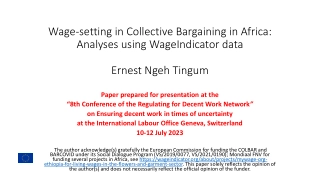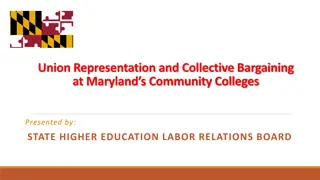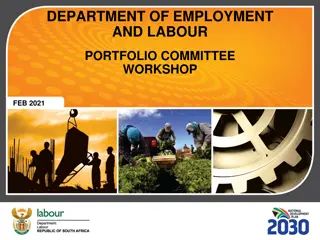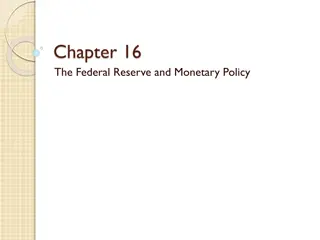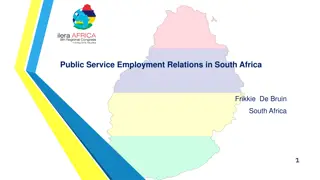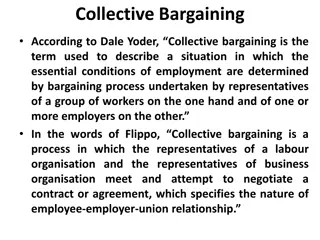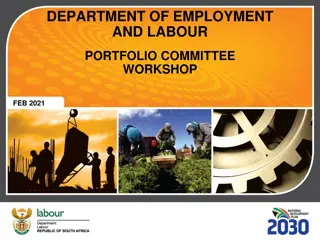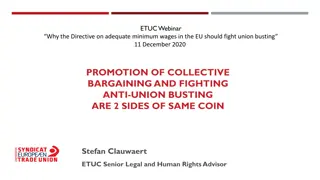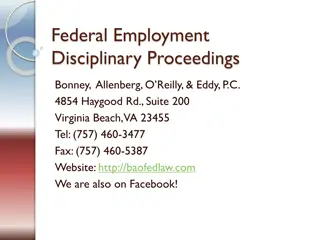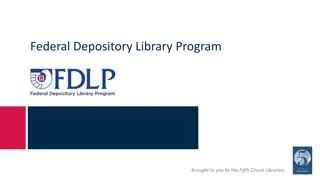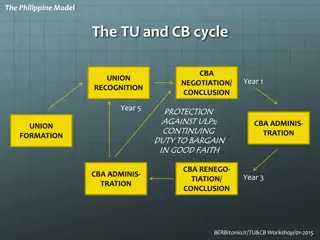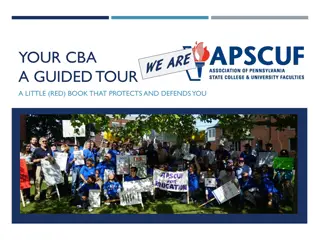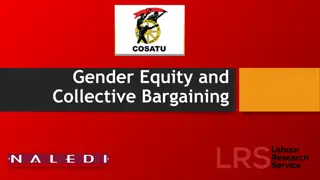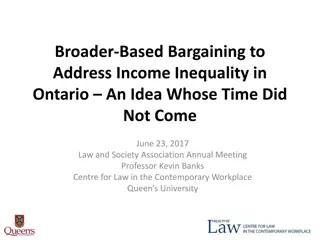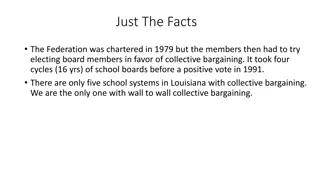Understanding the Role of FMCS in Federal Sector Bargaining
Explore the essential role of the Federal Mediation and Conciliation Service (FMCS) in federal sector bargaining, including its duties, services, and impact on labor relations. Learn how FMCS facilitates mediation to prevent disruptions in commerce and enhances relationships between labor and management. Discover the significance of FMCS in resolving negotiation impasses and promoting effective dispute resolution mechanisms.
Download Presentation

Please find below an Image/Link to download the presentation.
The content on the website is provided AS IS for your information and personal use only. It may not be sold, licensed, or shared on other websites without obtaining consent from the author. Download presentation by click this link. If you encounter any issues during the download, it is possible that the publisher has removed the file from their server.
E N D
Presentation Transcript
AVOID THE IMPASSES PANEL & GET A DEAL WITH FMCS! The Role of FMCS in Federal Sector Bargaining and How to Make Mediation Work for You Allison Beck Former Director, FMCS Former General Counsel, IAM 1 Richard Giacolone FMCS Commissioner
TODAYS TAKEAWAYS FMCS ROLE IN US LABOR RELATIONS FMCS ROLE IN FEDERAL SECTOR BARGAINING FMCS ENHANCED SERVICES TO FEDERAL SECTOR MEDIATION NOW MORE THAN EVER! 2
FMCS It shall be the duty of the Service, in order to prevent or minimize interruptions of the free flow of commerce growing out of labor disputes, to assist parties to labor disputes to settle such disputes through conciliation and mediation Independent agency No regulatory role No enforcement authority Prevent disputes By improving LM relationships 3
FMCS ROLE IN FEDERAL SECTOR BARGAINING SCHEME Executive Order 10988 Civil Service Bulletin 7005 1961 Task Force on Employee Management Relations Executive Order 11491 1978 Federal Service Labor Management Relations Statue 4
EXPANDED FMCS FEDERAL SECTOR SERVICES 2009-2017 EO on Labor-Management Forums Federal Sector Law & Practice Webinars Federal Sector Success Story Webinars National Labor-Management Conference Laying the foundation to survive in tough times! 5
WHY MEDIATION? Mediation, the use of a third-party neutral, can help you bridge the gap. 6
ITS THE LAW! 7119. Negotiation impasses; Federal Service Impasses Panel (a) The Federal Mediation and Conciliation Service shall provide services and assistance to agencies and exclusive representatives in the resolution of negotiation impasses. The Service shall determine under what circumstances and in what manner it shall provide services and assistance. (b) If voluntary arrangements, including the services of the Federal Mediation and Conciliation Service or any other third-party mediation, fail to resolve a negotiation impasse-- (1) either party may request the Federal Service Impasses Panel to consider the matter, or (2) the parties may agree to adopt a procedure for binding arbitration of the negotiation impasse, but only if the procedure is approved by the Panel. 7
A Mediator Can. Clarify Issues Define problems Generate options Explore alternatives Keep talks moving Make suggestions Establish realistic expectations Can help with your constituents Can say things to the other side you can t (or shouldn t) 8
FMCS Mediation Resolve Impasse Improve Communication Improve Relationships (FMCS uniquely positioned to help) Positively Affect Conflicts in the Future You will most likely see us again! 9
Mediation Techniques 1. Ask Questions 2. Listen 3. Restate, Reflect, Reframe 4. Identify Interests 5. Identify Common Ground 6. Communicate Impartiality 7. Express Realistic Optimism 8. Explore Options 9. Objectively Explain Risks of FSIP Intervention 10
Avoiding Impasse Come to mediation ready to justify your position and interests Be prepared to demonstrate need for your proposal Be prepared to show that your proposals will have a positive affect on modern and progressive work practices to facilitate and improve employee performance and the efficient accomplishment of the operations of the Government Don t forget to think about, document, and present the costs and benefits of the proposals 11


